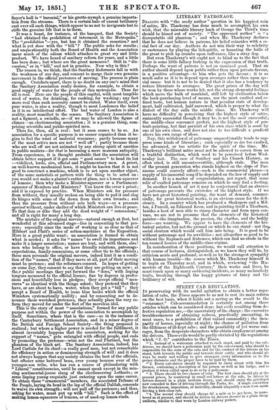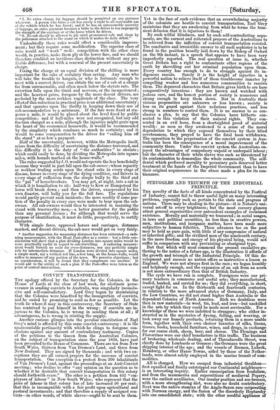STREET CAB REGULATION.
Ix persevering with its useful agitation to obtain a better regu- lation of cabs, the Times appears to us not to rest its main reform on the best basis, when it holds out a saving as the result to the "consumer." Cab-accommodation is certainly not among those articles which can be considered dear; but evils resulting from de- fective regulation are,—the uncertainty of the charge ; the excessive troublesomeness of obtaining redress, practically amounting, in most cases, to a prohibition of that valued commodity ; the inca- pacity of horses, especially at night ; the chance of pollution from the filthiness of ill-kept cabs ; and the possibility of yet worse out- rages, from the desperate characters who obtain employment among the drivers. These evils would be partly obviated by the regulations which "J. 0." contributes to the Times.
"1. Instead of a waterman attached to each stand, and paid by the cab- drivers, we should have a policeman paid by the cab-owners, who should be responsible for the state of the cabs and for the conduct of the drivers on his stand, both towards the public and towards their cattle, and who should al- ways be ready and willing to give strangers every information as to the proper distances and the proper fares to be paid by them.
" 2. Every cab-driver should be required to carry about with him his licence, containing a description of his person as well as his badge, and to produce it when called upon to do so by a policeman.
" 3. There should be two classes of cabs. The first class should ply at the present prices, be numbereil in small red letters at the side, be driven by drivers dressed in a plain uniform livery., and should enjoy the privileges now conceded to flies of driving through the Parks, &c. A single conviction for drunkenness, imposition, or incivility, should disqualify a man from again driving a first-class cab.
"4. The second class should charge 6d. a mile or ls. per hour, be num- bered as at present, and should be driven by drivers dressed in a plain cheap uniform, similar to that worn by London railway porters. "5. No extra charge for luggage should be permitted on any pretence whatever. A person who hires a cab has surely a right to all reasonable use of the vehicle which he has hired ; and if he has an unreasonable quantity of luggage, an extra payment becomes a bribe to the driver to tax improperly the strength of the carriage or of the horse which he drives. "6. No cab should be allowed to ply until pronounced safe and clean by the policeman attached to the stand on which it makes its daily &Inn."
Undoubtedly these rules would effect a considerable improve- ment; but they require some modification. The superior class of cabs would not " work" well : competition with the other class would, in practice, make them ply at the lower fare, and we should therefore establish an invidious class distinction without any pro- fitable difference, but with a renewal of the present uncertainty in charge.
Fixing the charge at an equal division of the shilling is more important for the sake of certainty than saving. Any man who will take the trouble to bargain, or who is fortunate enough to meet with a correct driver, can obtain the use of a cab at a charge far from unreasonable, and often much below the statute rate. The extortion falls upon the timid and nervous, or the inexperienced ; and the heaviest gains, foregone by the more decent drivers, are pocketed by the more reckless vagabonds of the class. The very effeotof this reduction in practical price is an additional uncertainty ; and that operates upon the thrifty in keeping down their use of cab-accommodation to a minimum. If the fare were fixed at six- pence a mile, it would be placed about the level fixed by public competition ; and if half-miles were not recognized, but any odd fraction charged as a mile, although the injustice might grate upon the heart of the economical housewife, it would be recommended by the simplicity which conduces so much to certainty ; and it would be some compensation to the driver for "calling him off the stand" at so low a payment. Half of the uncertainty, however, within the Metropolis itself, arises from the difficulty of ascertaining the distance traversed, and this difficulty it is the duty of " the authorities " to obviate ; which could easily be done, by dividing the Metropolis into square miles, with bounds marked on the house-walls.*
The rules suggested by/. O. would not operate the less beneficially because they would in part fall upon the cab-owner ; whose rapacity or reckless trading sends upon the stand cabs in every stage of disease, horses in every stage of the dying condition, and drivers in every stage of ruffianism from the simple bully to the thief and the "pal of housebreakers. You may get, at night, into a cab in which it is humiliation to sit : half-way to Kew or Hampstead the horse will break down; and then the driver, exasperated by his own disaster, will bully you for the full fare. The regulations would partly prevent such incidents ; the more readily if some por- tion of the penalty in every case were made to bear upon the cab- owner. Al 1 cab-owners would then be interested in manning the stand with trustworthy men,—a better guarantee for the public than any personal licence ; for although that would serve the purpose of identification, it must do little, prospectively, to certify character.
With simple fares, approved horses and carriages, distances marked, and decent drivers, the cab-user would get on very fairly.
* Another suggestion for measuring distances has been reiterated—a radi- ating measurement, with the Head Post-office as a centre : but a little con- sideration will show that a plan dividing London into square miles would be more practically useful in regard to cab-travelling. A radiating measure- ment would furnish no scale for cross-distances, nor any perfectly simple rule for intermediate distances. If London were divided into square miles, a simple mark, say a vertical red line, a foot long, on the house-walls, would suffice to measure off any portion of the town. We perceive objections ; but on consideration, it will be found that they compensate one another. It would add to the utility of such a plan if the Post-office were taken as the point of central intersection.



























 Previous page
Previous page